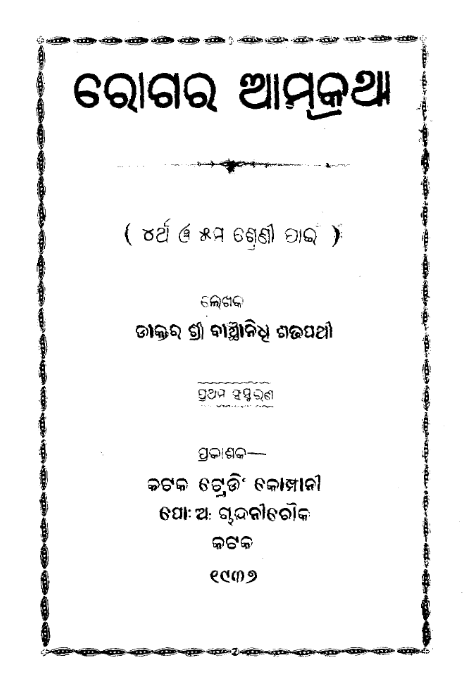Published in 1937, Rogara Atmakatha (The Autobiography of a Disease) by Banchhanidhi Satapathy is a seminal work in Odia literature that merges autobiography with social commentary. This pioneering text transcends traditional narratives, exploring the intersection of physical illness and the human experience, thus marking its place as a crucial textbook in the realm of Odia literature and social awareness.
Banchhanidhi Satapathy, an influential figure in Odia literature, utilized his personal struggles with disease as a lens to understand broader societal issues. The 1930s was a period of socio-political change in India, and Satapathy’s work captures the zeitgeist by addressing themes of health, suffering, and human resilience.
Rogara Atmakatha is not merely an account of physical illness; it delves into the psychological, emotional, and social ramifications of living with chronic health challenges. This holistic approach to the subject makes it stand out, as it contributes to a greater understanding of how diseases affect individuals and their families, both physically and socially.
The text is structured as a first-person narrative, allowing readers to intimately connect with Satapathy’s experiences. This autobiographical style invites empathy and reflection, as readers journey with the author through his vulnerabilities and insights. The language is simple yet evocative, making it accessible to a wide audience, from students to scholars.
Satapathy’s compelling prose is infused with poetic expressions that enhance the emotional depth of the narrative. His vivid descriptions not only convey the pain associated with illness but also reflect a profound resilience and unwavering hope for healing and understanding.
One of the central themes of Rogara Atmakatha is the idea of suffering as a universal human experience. Satapathy eloquently articulates how illness can isolate individuals, yet also serves as a conduit for camaraderie and support among those who understand the shared experience of pain. He emphasizes the importance of compassion, urging society to foster a culture of empathy towards those afflicted by diseases.
Moreover, the work engages critically with the societal stigma surrounding illness, highlighting the need for awareness and education. Satapathy advocates for a more informed society that offers not just treatment but also emotional support and understanding.
Rogara Atmakatha has left an indelible mark on Odia literature, serving as a crucial reference point for students and scholars alike. It is often included in academic syllabi, where it is studied not just for its literary merits but also for its sociocultural insights. The book encourages discussions around health education and public awareness—a testament to Satapathy’s vision of a compassionate society.
In contemporary times, where mental health and chronic illness are increasingly recognized as critical issues, Satapathy’s work gains renewed relevance. The narrative serves as a reminder that at the intersection of disease and humanity lies a shared story that compels us to empathize and support one another.
Books Info
| Books name | Rogara Atmakatha / ରୋଗର ଆତ୍ମକଥା |
| Author | Banchhanidhi Satapathy |
| No Of pages | 244 |
| Publisher | Cuttack Trading Company |
| Publication | 1937 |
| Printed At | NA |
| Distributor | NA |

